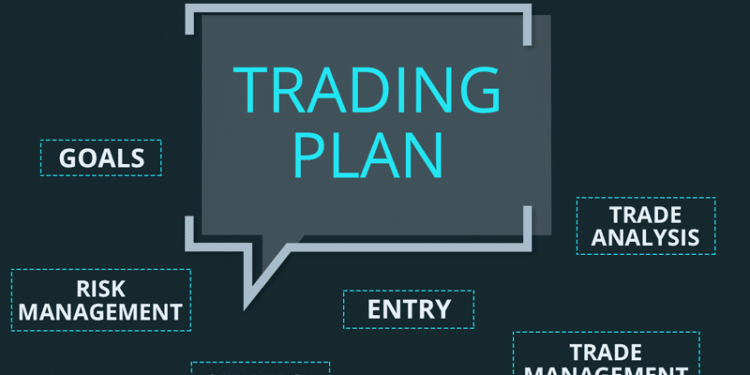Why have a trading plan?

There are no rules in the markets. Well, outside of the margin requirements of your broker and the regulations that pertain to specific exchanges, like trading hours, uptick or daily volatility limit, there are no rules of how to trade.
In the environment without rules, how do people make decisions? Essentially, people follow their emotions or instincts. Instincts can often help us to survive when there is a danger to our lives. However, in the market, instincts don’t serve us well.
A trading plan gives us a framework to restrain our trading decisions and minimizes the emotional factor, thus improving the efficiency of trading decisions leading to profitability.
The purpose of the trading plan is to have an impact on our trading. If you have a trading plan that’s written in detail, but you don’t follow it, obviously it’s not going to help you.
Every trader experiences the times when it’s easy to follow the trading plan. There are also times when traders are entirely off the rail.
Are there any techniques to mitigate the times when we’re out of control but instead follow the plan better? Let’s find it out by looking at five ways to be more disciplined in following your trading plan.
1.Trust your trading plan

The execution of your trading plan is directly related to your trust in it. The best way to develop that trust is to see positive results over a considerable amount of time as the result of trading following your plan.
There is a problem here. When you’re new to the markets, it’s tough to design a trading plan from scratch. You don’t know what to expect from the markets and yourself. You don’t know yet what works for you. On the other hand, you need a trading plan to get that experience.
You either won’t survive in the markets without managing risks properly or won’t absorb the experience without relating what’s happening to some measure that you’ve chosen (your trading concept, rules, etc.).
Summing up, you need the experience to make a trading plan, and you need a trading plan to gain experience! What a vicious cycle! It often sounds like getting hired on the first job after graduation!
There are two necessary steps to address this problem:
- Give yourself a chance to learn how to trade by limiting your risks! Decide to limit your losses to a particular amount. Imagine how you would feel after ten losses in a row, and how your account balance would look like. Adjust the number of your average losses to withstand these kinds of losing streaks without hurting your account balance too much.
- Do some research and choose a set of trading rules (entry, exit, time, etc.) to follow, and get the feel of the market. Ideally, these rules should have some statistical edge over the sample of at least 100 trades.
Your plan must cover any possible scenarios regarding your trading, so you don’t have to be surprised at any point and let your emotions get in the way of your trading.
2.Social pressure to follow that plan

Social pressure is one of the strongest forces that influence the behavior of human beings. Let’s turn it in our favor. It’s a good idea to find somebody that you admire and hold yourself accountable for following your trading plan to that person.
For example, you can check in with them once a week. Let the accountability partner ask you “How was your week? How did you follow your trading plan?”. It’s even better if they don’t have any experience in trading so you wouldn’t have much of a chance to justify yourself if you did some violations of your trading plan.
This principle helps in many other areas of our lives. People use accountability method to quit smoking or to lose weight. Why shouldn’t it work for quitting breaking the rules of your trading plan?
3.Life style choices
When trading, you need to eliminate distractions from any other areas of your life, such as family, other work, etc. Get your personal life right before you start trading. Otherwise, those unresolved matters will slow you down by staying at the back of your mind.

There are usually specific periods when the most interesting price action happens. For example, in Forex market, the busy times are the several hours during the overlap of European and Asian sessions, in the stock markets it’s usually the first and the last two hours of the session.
You must intentionally make yourself focused during those times. Even if you trade big timeframes such as Daily or Weekly, make sure you’re at your best mental state during the times when you make trading decisions. For example, trading Forex Daily charts, plan to be fresh at the closure of the US session so that you can make the best trading decisions at the close of Daily candle. It requires lifestyle choices such as planning your day in a particular way.
4.Diet choices
This point is very overlooked when trying to install the right habits for your trading routines. The truth is, food affects our minds, how comfortable and how alert we are while trading.

Ever felt drowsiness in the afternoon, especially after eating a lot of carbohydrates? How do you feel after coffee or alcohol? Coffee can be quite a double-edged sword in terms of alertness. Your mind may be stimulated, but the risk of being impatient also increases.
The sleeping time also affects what food we crave and eventually the quality of our judgement when making trading decisions. It’s a good idea not to drink any alcohol an hour before sleeping and avoid any mind-stimulating activities. It will help you to sleep better, and your body won’t demand foods in the morning that disbalance your perception during trading.
5.Self-talk
Humans have an outstanding ability to form new habits as a result of positive or negative reinforcement.

When we’re kids, if we’re always yelled at when making a mistake, guess what happens, we grow-up with a seemingly inborn fear of taking risks, and we are too hard on ourselves if things don’t go the way we expect.
On the contrary, if whoever in authority (parent, teacher, boss, etc.), communicates wisely in response to our mistakes, it drastically changes the perspective about success. We start to see our mistakes (and their inevitability) as the building blocks of the success, instead of the stumbling ones.
Keep close attention to how you react to your mistakes in trading, either verbally or in your mind. One of the best ways to do it is to use a trading journal. In the trading journal, you can express your emotions and self-talk on the paper (or by typing if you decide to keep it digital). Not only it allows you to crystalize your thoughts for further evaluation, but the actual process of writing also releases stress or any repressed emotions that may manifest themselves subconsciously and negatively affect your trading performance.
Highlight with a green color anything positive, that you speak about yourself in the journal and for anything negative use the red highlighter. When you make your weekly journal reviews, you’ll quickly notice many patterns of negative self-talk that pop up as you trade. Look into those red color phrases and devise the tactics to replace them with the positive ones.
The market is the wild environment that can be overwhelming with the amount of information flow and action going on. If we don’t restrain ourselves, the emotions will negatively affect our trading decisions. That’s why we need a trading plan to be profitable in the long run. To have a trading plan and follow it are different things. To make it work, integrate your trading plan with your personality and life circumstances, so it’s natural for you to follow it.







